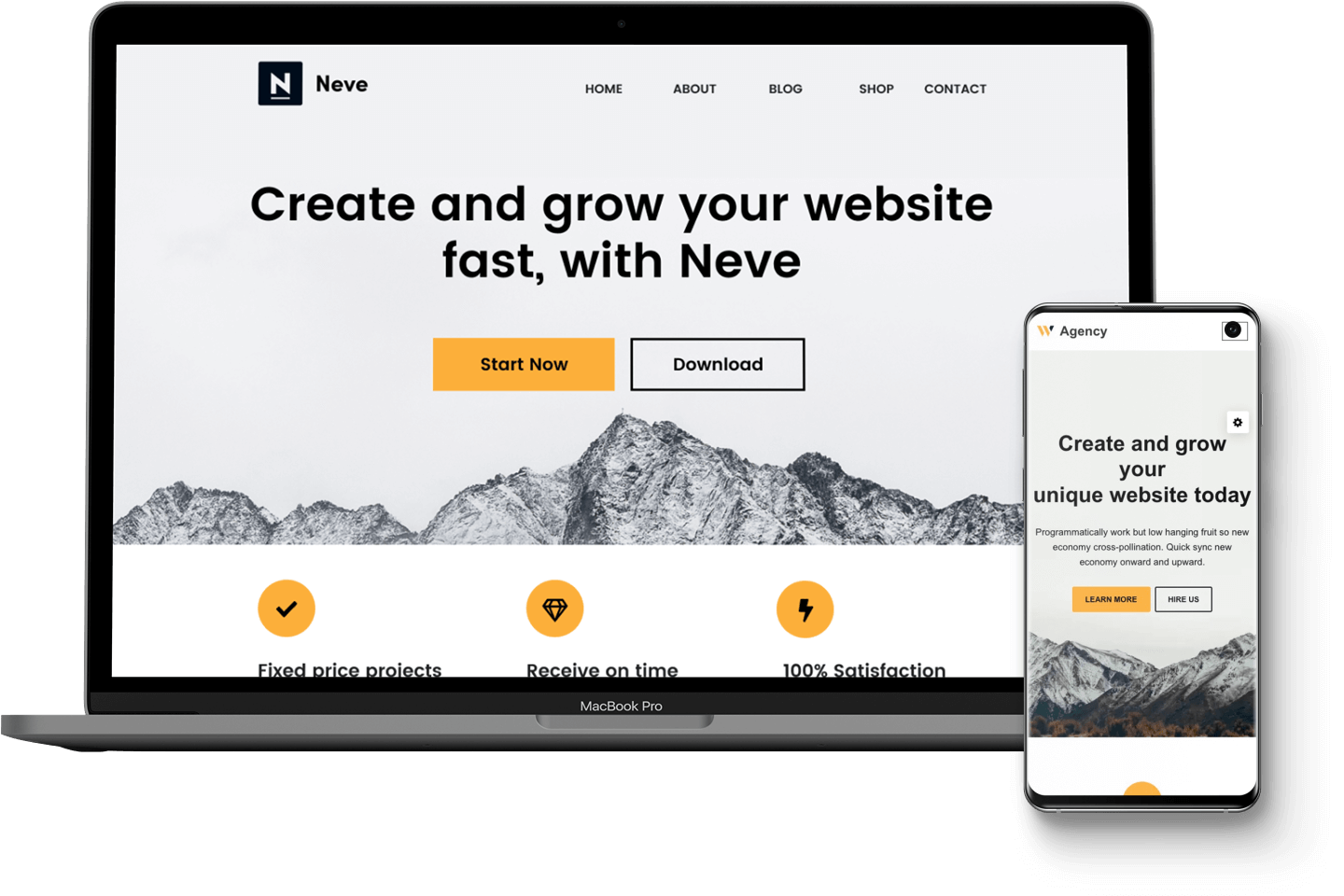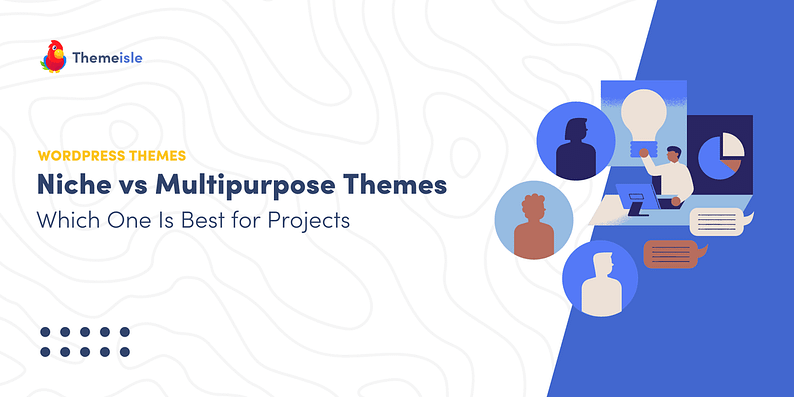“Sidebars, widgets, themes, plugins, categories, tags, permalinks” – seeing all these terms can cause a headache if you’re a beginner. Sure, these terms sound cool, their meanings are obvious to developers, and it seems that WordPress wouldn’t have the same exponential expansion without those. (I dare to say that even Big Bang is a little bit jealous about WordPress’ expansion.)
Anyway, two other terms that might cause some head scratching when talking about WordPress themes are “niche” and “multipurpose.”
What exactly are they? 🤷♂️
In this post, I will unravel their meanings, and I’ll also try to help you decide which of the two will be best for your future website – a niche theme or a multipurpose theme?
Niche WordPress themes
The barrier between niche and multipurpose themes isn’t set in stone, and there aren’t criteria to make a clear distinction between niche and multipurpose ones.
That being said, a niche theme is aimed to be used for a specific field – there are niche themes for churches, charity projects, schools, DJs, events, etc. These themes ship with features that are useful mostly for their respective kind of project. Wrapping up, a niche theme should be used mostly – if not only – for a specific purpose. Nothing more, nothing less.
Multipurpose WordPress themes
The name is quite self-explanatory in itself. These themes can fit any kind of project: blogs, magazines, news sites, portfolios, business projects, online shops, etc.
Neve is a multipurpose theme of Themeisle’s that has made its mark on the web, and is now valued by thousands of users.

Another example, Divi is the Elegant Themes flagship theme, and it’s one of the most used WordPress themes out there. Lastly, Avada, another multipurpose theme, has been trusted by more than 900,000 customers so far. Among the best-selling multipurpose WordPress themes, you can also find Total by WPExplorer.
Under the hood, these themes don’t miss any particular feature; you have at your disposal everything to create a wonderful WordPress website! Without any doubt, these multipurpose themes are some of the most advanced tools allowing you to create websites without writing a line of code.
Which is better? Niche or multipurpose WordPress themes
I hope that you have a better understanding of what the differences between niche and multipurpose themes are. Now let’s look into which is going to be better for your specific project:
First off, I hate answers that begin with “it depends on,” but in this case, the context and the purpose of the website has a major role. This means that unfortunately I don’t have a blanket, cookie-cutter solution for this dilemma. However, there are some general guidelines you can follow that will help you choose the proper theme. They depend on the following criteria:
- The type and the complexity of the website
- The user skills
- The time invested into the pre-launch phase
1. The type and the complexity of the website 🚧
Selecting a niche or a multipurpose theme hinges on the type and the complexity of the project. If you want to develop a huge website with lots of options then you should go for a multipurpose theme.
On the other hand, if you want a decent website just to let people know that you and your business are online, then a simple niche theme might serve you better (if one exists for your specific niche).
For instance, if you want to launch a web design blog, you should go for a multipurpose theme. Over time, you might decide to introduce sections to showcase your best works or sell courses, works, or various services. In other words, your blog could evolve into a portfolio or an online store for which multipurpose themes are better suited.
2. The user skills 👨💻
Another thing to consider is your own confidence level in customizing a theme and making it functional.
If you identify more as a “beginner,” then a niche theme will likely suit you better. These themes are usually easier to set up and don’t overwhelm you with unnecessary options.
For those with a bit more experience, a multipurpose theme might be a better choice. While some of these themes can be complex and potentially problematic for certain users, virtually all of them offer reliable support. Plus, the WordPress community is always ready to step in and help out if you have questions.
3. The time invested into the pre-launch phase 🕓
Another crucial consideration in the niche vs. multipurpose debate is the investment of time involved.
Setting up a WordPress website is a substantial endeavor, demanding a significant amount of time. Even the most seasoned WordPress users allocate time to explore all the theme’s features before launching it online.
Typically, a niche theme offers fewer options, which means you’ll spend less time on customization. On average, niche themes garner fewer sales than multipurpose themes, so your site has a lower chance of resembling others.
In contrast, setting up a multipurpose theme demands more effort because of its myriad features. Additionally, your site has a higher likelihood of looking like others compared to using niche themes.
However, at the end of the day, those numerous features empower you to craft stunning creations.
Last word on niche vs multipurpose themes 💬
To conclude our analysis of niche vs multipurpose themes, the final point to drive home is that you should make sure you have a clear plan before launching your new website. By completing all the steps in your plan, you’ll know by the end whether to choose a niche theme or a multipurpose one.
💡 My personal advice: Read this blog post carefully. Consider all the tips, and think about the type of website you want to launch and your available resources, including time. After you’ve clearly defined these elements, revisit this post. Then make your decision.
Who’s your personal winner in the niche vs multipurpose themes debate? Let us know in the comments!
Free guide
4 Essential Steps to Speed Up
Your WordPress Website
Follow the simple steps in our 4-part mini series
and reduce your loading times by 50-80%. 🚀
Free Access
About the author: Daniel Pintilie is a blogger and internet marketer ready to create valuable, actionable and interesting content for your website. He is in love with WordPress and internet marketing. You can get in touch with him by visiting his portfolio – Daniel2Writing.com.
* This post contains affiliate links, which means that if you click on one of the product links and then purchase the product, we’ll receive a small commission. No worries though, you’ll still pay the standard amount so there’s no additional cost on your part.





















Or start the conversation in our Facebook group for WordPress professionals. Find answers, share tips, and get help from other WordPress experts. Join now (it’s free)!